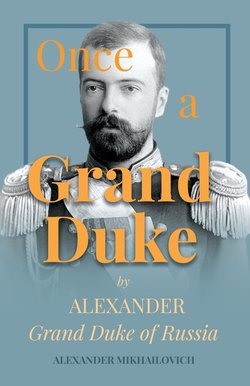Читать книгу Once A Grand Duke by Alexander Grand Duke of Russia - Alexander Mikhailovich - Страница 22
На сайте Литреса книга снята с продажи.
4
ОглавлениеBut nobody could have closed that exciting subject in the winter of 1880-1881. The members of the imperial household and the venerable leaders of St. Petersburg society were openly accusing Princess Yourievskaya of planning to entrust her favorite, General Loris-Melikoff, with dictatorial powers and to bring about radical changes in the Constitution.
As is always the case, the women proved to be particularly merciless in their denunciations of Gogo’s mother. Guided by hurt vanity and blinded by bitter jealousy, they rushed from house to house repeating the wildest possible rumors and spreading poisonous calumny. It mattered not that Princess Yourievskaya belonged to the old historical family of Dolgoroukys who traced their origin directly to Rurick, the Scandinavian conqueror of Russia. In fact, it made her situation more precarious, the insatiable gossipers dwelling with relish upon the fantastic tales of the imaginary feud between the Romanoffs and the Dolgoroukys. They talked of a peasant prophet who had predicted two hundred years ago that swift death would befall any Romanoff marrying a Dolgorouky. They quoted the tragic end of Emperor Peter II to lend strength to this crazy theory. Did he not die on the day set for his wedding to the young Princess Nathaly Dolgorouky? Was it not significant that the best of physicians failed to save this only son of Peter the Great?
EMPEROR ALEXANDER III, FATHER-IN-LAW OF GRAND DUKE ALEXANDER, IN 1888
THE IMPERIAL FAMILY OF RUSSIA IN 1888. ON THE BALCONY, LEFT TO RIGHT: GRAND DUCHESS XENIA, EMPEROR ALEXANDER III HOLDING GRAND DUCHESS OLGA ON HIS SHOULDER, HEIR APPARENT AND THE FUTURE CZAR NICHOLAS II, EMPRESS MARIE. BELOW, LEFT TO RIGHT: GRAND DUKE GEORGE ALEXANDROVICH (“GEORGIE”) AND GRAND DUKE MICHAEL ALEXANDROVICH (“MISHA”).
GRAND DUKE SERGEI MICHAILOVICH
GRAND DUKE NICHOLAS MICHAILOVICH
GRAND DUKE GEORGE MICHAILOVICH
THE THREE BROTHERS OF GRAND DUKE ALEXANDER WHO WERE ASSASSINATED BY THE BOLSHEVIKS.
Our family doctor tried in vain to remind the superstitious scandalmongers that the medical science of the eighteenth century did not know how to fight smallpox, and that the young Emperor would have passed away in any event had he been engaged to the “luckiest” girl in the world. The gossipers appreciated his learned zeal but went ahead with their campaign. They thought it would require a greater eloquence than his to explain why the outburst of the present terroristic activities had coincided with the beginning of the romance of Alexander II.
“My dear doctor,” said a titled lady of wide acquaintances, “with all due respect to the miracles of modern science, I really cannot see how the men of your profession could stop the nihilists from throwing bombs in the direction pointed out by our great Dictator . . .”
The last remark referred to General Loris-Melikoff whose conciliatory policies had aroused a storm of indignation in the ranks of the unemployed statesmen and the unrecognized saviors of the country. His spectacular career provided an inexhaustible topic for the fashionable tea parties. A brave commander of an army corps and an assistant of my father during the Russian-Turkish War in 1877-1878, he was described by the whisperers as the Man Friday of Princess Yourievskaya. Appointed to a post equivalent in importance to that of Prime Minister of England, he enjoyed the unlimited confidence of the Czar but his deep affection for the sovereign, no doubt, handicapped his actions: in a death-fight with the forces of anarchy he constantly kept in mind the pathetic vision of a pair of lovers in the Winter Palace begging him to prolong their short moments of happiness. The classical phrase about a man who knows the better way but prefers to follow the worst would have perfectly fitted the plight of this honest soldier. After a long period of hesitancy he decided to take the advice of a woman in love and to extend an olive branch to the nihilists. That in turn precipitated the tragic climax. The revolutionaries—a small fraction of the population of the larger cities—doubled their demands and threatened open revolt. The loyal supporters of the throne shrugged their shoulders in dismay and stepped aside. The people—one hundred twenty million peasants spread all over the empire—said that the landlords had hired an Armenian general to kill the Russian Czar because he had liberated the serfs!
A surprising conclusion but a logical one considering that outside of St. Petersburg, Moscow and a half dozen provincial towns where the daily papers were printed, the whole empire lived on rumors, and the grapevine telegraph provided the only channel for the spreading of political news. A well-known leader of the radical intelligentsia, Feodor Rodicheff, wrote in his memoirs that each time an important official was killed by the nihilists in the capital, the villagers reacted by burning the estate of a family suspected of revolutionary sympathies.
A cynical ruler could have easily used this singular mentality of the peasants for the purpose of upholding the principle of absolute monarchy, but the graduates of the Imperial Military Academy never were taught the fine art of governmental cynicism. On the eve of the New Year of 1881 General Loris-Melikoff placed on the desk of the Czar a project of radical reforms, which borrowed most of its ideas from the constitutions of England and France.
